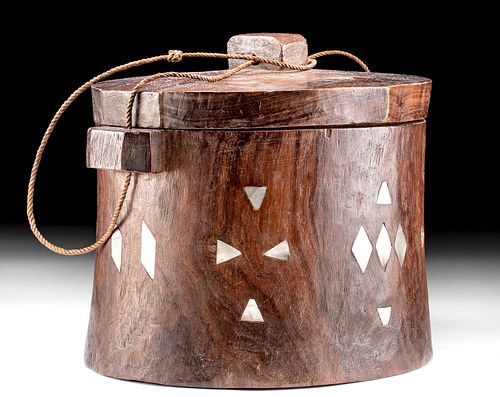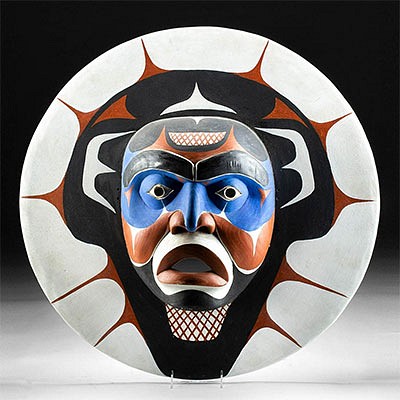19th C. Tokelau Island Wood Tuluma (for fishing)
Lot 113b
About Seller
Artemis Fine Arts
686 S Taylor Ave, Ste 106
Louisville, CO 80027
United States
Selling antiquities, ancient and ethnographic art online since 1993, Artemis Gallery specializes in Classical Antiquities (Egyptian, Greek, Roman, Near Eastern), Asian, Pre-Columbian, African / Tribal / Oceanographic art. Our extensive inventory includes pottery, stone, metal, wood, glass and textil...Read more
Categories
Estimate:
$1,500 - $2,500
Absentee vs Live bid
Two ways to bid:
- Leave a max absentee bid and the platform will bid on your behalf up to your maximum bid during the live auction.
- Bid live during the auction and your bids will be submitted real-time to the auctioneer.
Bid Increments
| Price | Bid Increment |
|---|---|
| $0 | $25 |
| $300 | $50 |
| $1,000 | $100 |
| $2,000 | $250 |
| $5,000 | $500 |
| $10,000 | $1,000 |
| $20,000 | $2,500 |
| $50,000 | $5,000 |
| $100,000 | $10,000 |
| $200,000 | $20,000 |
About Auction
By Artemis Fine Arts
Mar 18, 2021
Set Reminder
2021-03-18 10:00:00
2021-03-18 10:00:00
America/New_York
Bidsquare
Bidsquare : Pre-Columbian | Tribal | Oceanic
https://www.bidsquare.com/auctions/artemis-gallery/pre-columbian-tribal-oceanic-6520
Featuring Pre-Columbian, Native American, African / Tribal, Oceanic, much more. All items have been legally acquired and are legal to sell. Convenient in-house shipping. Artemis Fine Arts info@artemisgallery.com
Featuring Pre-Columbian, Native American, African / Tribal, Oceanic, much more. All items have been legally acquired and are legal to sell. Convenient in-house shipping. Artemis Fine Arts info@artemisgallery.com
- Lot Description
Oceania, Polynesia, Tokelau Island (territory of New Zealand), ca. 19th century CE. A lovely carved wooden tuluma, a lidded container used to carry fishing gear, baits, and other items meant to be kept dry while fishing out at sea. The ovoid body has a flat base, a deep basin, and exterior walls adorned with inlaid nacre (also mother-of-pearl) fragments of triangular and diamond shapes that form broad geometric motifs. Three perforated rectangular tabs are present along the walls and atop the form-fitting lid and have a twisted fiber cord running through each to ensure the lid is not accidentally lost during the fishing expedition. The Tokelau Islands are a trio of atolls north of American Samoa that have been inhabited for 1000 years, during which time they have developed a rich artistic tradition. That skill is even displayed in utilitarian items like this example. Size (w/ lid): 9.875" W x 7.7" H (25.1 cm x 19.6 cm)
For another example of a tuluma and additional information, please see The Museum of New Zealand (Te Papa Tongarewa), registration number FE010386.
Provenance: private Hawaii, USA collection; ex-Richard Kelton collection, Louisiana, USA, acquired between 1970 and 2000
All items legal to buy/sell under U.S. Statute covering cultural patrimony Code 2600, CHAPTER 14, and are guaranteed to be as described or your money back.
A Certificate of Authenticity will accompany all winning bids.
We ship worldwide and handle all shipping in-house for your convenience.
#157111Loss to one small inlaid nacre fragment as shown. Light staining to twisted fiber cord, otherwise intact and excellent. Great patina and smooth surface textures throughout.Condition
- Shipping Info
-
All shipping is handled in-house for your convenience. Your invoice from Artemis Gallery will include shipping calculation instructions. If in doubt, please inquire BEFORE bidding for estimated shipping costs for individual items.
-
- Buyer's Premium



 EUR
EUR CAD
CAD AUD
AUD GBP
GBP MXN
MXN HKD
HKD CNY
CNY MYR
MYR SEK
SEK SGD
SGD CHF
CHF THB
THB

















